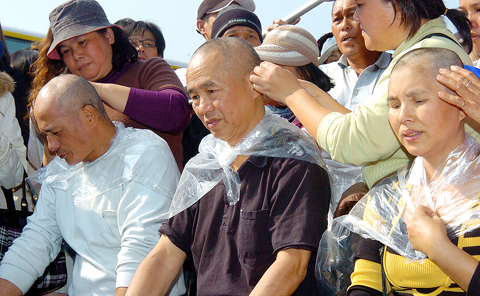Film director Hou Hsiao-hsien (侯孝賢) shaved his head to show support for residents of the Sanying Aboriginal Community (三鶯部落) who staged a demonstration yesterday to protest a Taipei County Government plan to demolish the community.
“Aborigines have been living on this island long before the migrants from China moved here,” Hou said after shaving his head on Ketagalan Boulevard in front of the Presidential Office as Sanying residents and supporters protested. “The Aboriginal way of life should be respected.”
Besides Hou, Aboriginal actors Ma Chih-hsiang (馬志翔) and Suming, as well as writer Chu Tien-hsin (朱天心) attended the protest.

PHOTO: CHANG CHIA-MING, TAIPEI TIMES
“It took Sanying inhabitants a lot of effort to rebuild their homes after they were destroyed, but as soon as next Monday, the community might be destroyed again,” Sanying Self-Help Group spokesman Chiang Yi-hao (江一豪) told reporters and demonstrators.
Sanying is located on a bank of the Dahan River (大漢溪) in Taipei County near the Sanying Bridge (三鶯大橋), which connects Sansia (三峽) and Yingge (鶯歌) townships.
Inhabitants in the community are mostly Amis Aborigines from Hualien and Taitung counties, working in Taipei as construction workers. They could not afford housing in the city, so they built their homes on a piece of abandoned land along the river around 20 years ago.
Saying that the area was classified as a “flood zone” that could not be inhabited, the county government has torn down the community several times — most recently in February — but residents rebuild their homes each time.
Although the county government has built an apartment complex to house Sanying residents, problems remain — some of the residents refuse to move, some cannot afford the rent, while others are nots qualified to move into the apartment complex since they did not live in Sanying when the government took a census in 1994.
As successive rounds of talks between residents and the government failed to generate a consensus, the county government posted a notice on Monday warning it would evict them within seven days, adding that they would be removed with force.
Lee Tsung-kwei (李宗桂), county Information Office director-general, appeared at the demonstration, explaining to reporters that the county government was acting according to law, and was trying hard to accommodate Sanying residents.
“This area has been classified as a flood zone and no one has been allowed to live in flood zones since the Water Conservation Law [水利法] came into effect in 1994,” Lee said. “We understand that many people have lived there since long ago, so we’ve built an apartment complex to accommodate them.”
When asked how the county government would help those who could not afford the rent, Lee said he would have to find out, adding “perhaps they can get help from the Social Welfare Bureau.”
Following a meeting held later yesterday, Lee said the county government has decided to postpon the decision on whether or to enforce the eviction till after the Lunar New Year holidays. This year’s Lunar New Year falls on Jan. 26.

Chinese Nationalist Party (KMT) Chairman Eric Chu (朱立倫), spokeswoman Yang Chih-yu (楊智伃) and Legislator Hsieh Lung-chieh (謝龍介) would be summoned by police for questioning for leading an illegal assembly on Thursday evening last week, Minister of the Interior Liu Shyh-fang (劉世芳) said today. The three KMT officials led an assembly outside the Taipei City Prosecutors’ Office, a restricted area where public assembly is not allowed, protesting the questioning of several KMT staff and searches of KMT headquarters and offices in a recall petition forgery case. Chu, Yang and Hsieh are all suspected of contravening the Assembly and Parade Act (集會遊行法) by holding

PRAISE: Japanese visitor Takashi Kubota said the Taiwanese temple architecture images showcased in the AI Art Gallery were the most impressive displays he saw Taiwan does not have an official pavilion at the World Expo in Osaka, Japan, because of its diplomatic predicament, but the government-backed Tech World pavilion is drawing interest with its unique recreations of works by Taiwanese artists. The pavilion features an artificial intelligence (AI)-based art gallery showcasing works of famous Taiwanese artists from the Japanese colonial period using innovative technologies. Among its main simulated displays are Eastern gouache paintings by Chen Chin (陳進), Lin Yu-shan (林玉山) and Kuo Hsueh-hu (郭雪湖), who were the three young Taiwanese painters selected for the East Asian Painting exhibition in 1927. Gouache is a water-based

Taiwan would welcome the return of Honduras as a diplomatic ally if its next president decides to make such a move, Minister of Foreign Affairs Lin Chia-lung (林佳龍) said yesterday. “Of course, we would welcome Honduras if they want to restore diplomatic ties with Taiwan after their elections,” Lin said at a meeting of the legislature’s Foreign Affairs and National Defense Committee, when asked to comment on statements made by two of the three Honduran presidential candidates during the presidential campaign in the Central American country. Taiwan is paying close attention to the region as a whole in the wake of a

OFF-TARGET: More than 30,000 participants were expected to take part in the Games next month, but only 6,550 foreign and 19,400 Taiwanese athletes have registered Taipei city councilors yesterday blasted the organizers of next month’s World Masters Games over sudden timetable and venue changes, which they said have caused thousands of participants to back out of the international sporting event, among other organizational issues. They also cited visa delays and political interference by China as reasons many foreign athletes are requesting refunds for the event, to be held from May 17 to 30. Jointly organized by the Taipei and New Taipei City governments, the games have been rocked by numerous controversies since preparations began in 2020. Taipei City Councilor Lin Yen-feng (林延鳳) said yesterday that new measures by